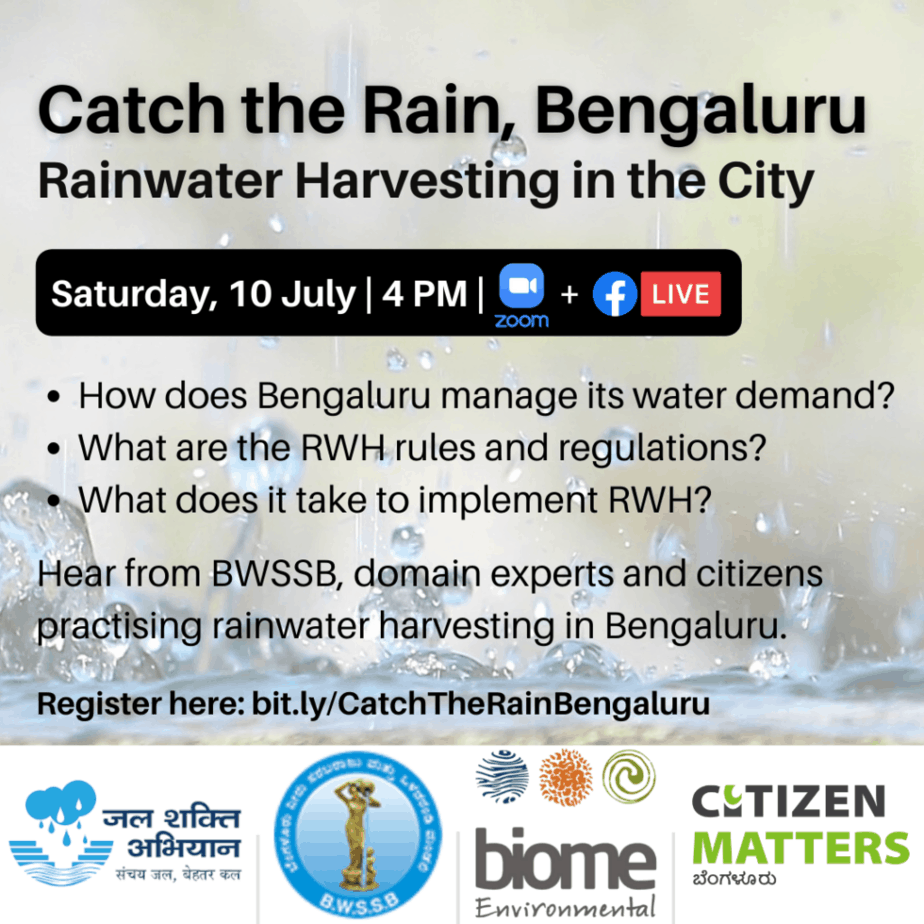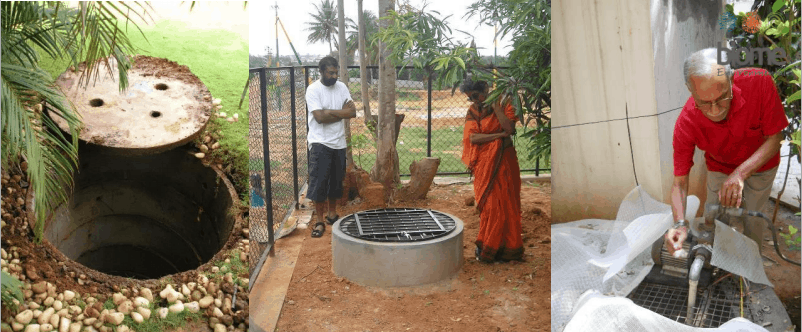
Monsoons are here and who doesn’t have happy memories of the fragrance of the first rain bringing along with it the much-needed relief from the weary heat of the Bengaluru summer. But then, along with memories, rains also bring inconveniences like localised flooding in urban areas and increased commute time!
In recent years, we see many Bengalureans struggling to access water during the summers. And one wonders where all the excess water from the rains disappeared.
Data shows that Bengaluru typically receives the highest rains in the months of August, September, and October. With August not too far away, now is the right time of the year to begin thinking about how rainwater can be used to address water issues faced by communities across Bengaluru.
Read More: The basics of rainwater harvesting
This year also happens to mark the 12 year anniversary of Rainwater Harvesting being made mandatory in Bengaluru. The Bangalore Water Supply and Sewerage Board (BWSSB) Act, 2009 declared that Rainwater Harvesting (RWH) systems are compulsory.
Over the years, BWSSB has come out with rules and regulations designed to encourage citizens and establishments to adopt rainwater harvesting. Recently, important updates have been made to the rainwater harvesting rules and regulations. This calls for awareness among citizens about the latest changes and how it affects them.
BWSSB has also set up the Rainwater Harvesting Theme Park in Jayanagar where citizens can see for themselves the various RWH structures on display and get advice.
According to BWSSB, Bengaluru has close to 1,55,000 properties that harvest rainwater, which makes it the second-largest number of installations for any city in India, next only to Chennai.

To create awareness among citizens and communities across Bengaluru, BWSSB and Biome Environmental Trust (BIOME) in collaboration with Citizen Matters, Bengaluru, are hosting a series of events on the theme of water in Bengaluru. The first of this series is Catch the Rain, Bengaluru: Rainwater Harvesting in the City to be held virtually on July 10, 2021, from 4 PM onwards, in association with Jal Shakti Abhiyan.
This webinar will help us understand rainwater harvesting and its benefits. Jal Shakti Ministry’s Additional Secretary Asok Kumar will speak about the Catch the Rain campaign. Senior officials of BWSSB share how water demand is being managed in the city, the applicable rules and regulations, and the role played by the RWH Theme park in Jayanagar. Also joining the discussion will be fellow citizens sharing their experiences of implementing rainwater harvesting and how they have benefitted from it.
The webinar will be followed by a brief Q & A session open to participants.
Catch the Rain, Bengaluru: Rainwater Harvesting in the City
Date: Saturday, July 10, 2021
Time: 4 PM onwards
Register here: bit.ly/CatchTheRainBengaluru
Speakers
- G Asok Kumar, IAS, Additional Secretary and Mission Director, National Water Mission
- N Jayaram, IAS, Chairman, Bangalore Water Supply and Sewerage Board
- B M Somashekar, Engineer-In-Chief, Bangalore Water Supply and Sewerage Board
- K N Rajeev, Additional Chief Engineer, Bangalore Water Supply and Sewerage Board
- B M Manjunath, PRO, Bangalore Water Supply and Sewerage Board
- Rakshitha ML, Project Officer, Biome Environmental Trust
- Abhishek Oommen, Citizen Champion, Resident of OMBR Layout
- Ashok Mruthyunjaya, Citizen Champion, Resident of Aditi Elite, Bellandur
- Joe Christopher, Citizen Champion, Resident of Nandi Deepa, Hulimavu
- Vishwanath Srikantaiah, Director, Biome Environmental Trust (Moderator)
- Ekta Sawant, Engagement Lead, Citizen Matters (Co-Moderator)
Do join us to get more insights about the opportunities of sustainable water supply in Bengaluru.
Can filtered rain water can be used directly to the borewell….is that there will be a soil erosion between the casing pipe and rock formation…
Hi, Could you guys kindly give link a link to this Webinar. How to register etc !!!
Hi, you can register by clicking on this link: https://bit.ly/CatchTheRainBengaluru
For more details, visit https://bengaluru.citizenmatters.in/catch-the-rain-bengaluru-rainwater-harvesting-in-the-city-63742
At several roads in Malleswaram many rain harvesting pits were dug, lined up with concrete rings and properly top closed. Good work. However the channel leading to these are blocked by muck, debris.I am a senior. Some one should get them cleaned. Seminars are ok. Participants should walk around first, get this job done, if we are serious. Thank you friends
BWSSB has already started putting fines in monthly bill for this new water harvesting bill. There is no problem for drainage chocking and non maintenance of sewage. Put new rule and give more penalties is the best way for revenue management system